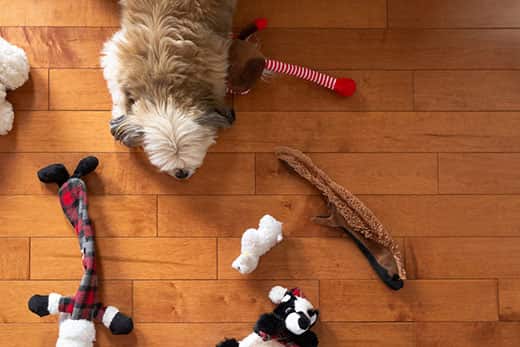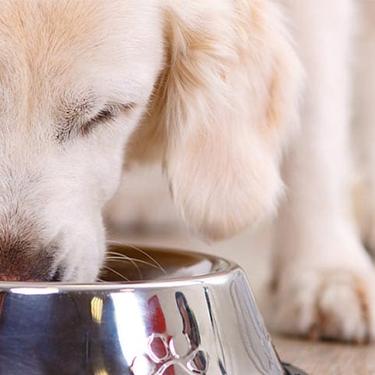
-
Find the right food for your pet
Take this quiz to see which food may be the best for your furry friend.
Find the right food for your pet
Take this quiz to see which food may be the best for your furry friend.
Featured products
 Adult Healthy Cuisine Roasted Chicken, Carrots & Spinach Stew Dog Food
Adult Healthy Cuisine Roasted Chicken, Carrots & Spinach Stew Dog FoodDelicious roasted chicken paired with tender vegetables in a succulent stew
Shop Now Small & Mini Savory Stew with Chicken & Vegetables Dog Food
Small & Mini Savory Stew with Chicken & Vegetables Dog FoodA delicious complement to the nutrition of Science Diet Small & Mini 7+ dog food
Shop Now Adult 7+ Perfect Digestion Chicken, Whole Oats & Brown Rice Recipe Dog Food
Adult 7+ Perfect Digestion Chicken, Whole Oats & Brown Rice Recipe Dog FoodScience Diet's breakthrough nutrition supports ultimate digestive well-being & healthy microbiome for dogs age 7+
Shop NowFeatured products
 Adult 7+ Tender Tuna Dinner Cat Food
Adult 7+ Tender Tuna Dinner Cat FoodWith delicious chunks in a decadent gravy
Shop Now Adult Savory Entrée Can Variety Pack Cat Food
Adult Savory Entrée Can Variety Pack Cat FoodPrecisely balanced nutrition with the delicious taste of savory minced chicken to help fuel the energy needs of cats during the prime of their life
Shop Now Adult 7+ Senior Vitality Chicken & Vegetable Stew Cat Food
Adult 7+ Senior Vitality Chicken & Vegetable Stew Cat FoodImproves Everyday Ability to Get Up & Go
Shop Now -
Dog
- Dog Tips & Articles
-
Health Category
- Weight
- Food & Environmental Sensitivities
- Urinary
- Digestive
- Joint
- Kidney
-
Life Stage
- Puppy Nutrition
- Adult Nutrition
- Senior Nutrition
Cat
- Cat Tips & Articles
-
Health Category
- Weight
- Skin & Food Sensitivities
- Urinary
- Digestive
- Kidney
-
Life Stage
- Kitten Nutrition
- Adult Nutrition
Featured articles
 Does My Pet Hate Me?
Does My Pet Hate Me?Learn tips for bonding with your pet if you've ever thought, 'My dog doesn't like me, or 'Why do I have a standoffish cat?'
Read More Do Dogs and Cats have Belly Buttons?
Do Dogs and Cats have Belly Buttons?Learn whether cats & dogs have belly buttons like humans, what the function is, and if there are any health concerns associated with it.
Read More Why Are Dogs and Cats So Cute?
Why Are Dogs and Cats So Cute?If waggy puppy dog tails and furry kitten yawns make you swoon, you're not alone. Why are cats so cute? And, dogs too! Let's find out!
Read More -


If you're a new dog parent and your dog is acting weird, you may be wondering, "what's wrong with my dog?" Even if you suspect something is wrong, you may not know how to tell if they are actually sick, what a sick dog looks or acts like, and why your pup's strange behavior may keep you up at night. And if your dog is actually sick and you don't notice the signs (or they're just good at hiding it), you may feel guilty and sad that you didn't know your dog was hurting.
While some symptoms of sickness, such as vomiting or diarrhea, can be obvious, many sickness behaviors in dogs are hard to pick up on if you don't know what to look for. Here are a few situations and signs that can help you figure out if your dog could be sick, and when you should consider contacting your veterinarian.
Sign #1: They're Not Eating
Most dogs will rarely miss a meal or special treat — especially when you set it in front of them. If your dog turns their nose up at their breakfast or dinner when they're normally gobbling it down, it's time to pay attention. Many things can cause a dog to stop eating. Nausea, tooth pain, anxiety, hormonal disorders, viral infections and gut pain are just a few of many things that can cause a dog to stop eating.
Schedule an appointment with your veterinarian if your dog doesn't eat for more than a day or misses more than two meals.
Sigh #2: They're Just Lying Around
If you notice that your dog is sleeping more, dragging behind on walks, uninterested in play or not playing as much as they used to, then something might be wrong. Sometimes, it's just too hot outside to play and exercise. When the temperatures rise, dogs are naturally a little more lazy. On the other hand, if it's not hot, then this behavior indicates that something more may be at play.
There are many things that can cause a loss of energy in a dog. Any kind of infection, whether it be viral, bacteria or fungal, can cause loss of energy. Heart disease or breathing problems of any kind can make a dog feel tired. Hormonal disorders, such as low thyroid, can cause increased lethargy. Obesity can cause a dog to sleep more because it is exhausting to get around. Obesity can also lead to things like degenerative joint disease making it more painful for your dog to run and play. This can create a frustrating cycle where your dog may struggle to exercise, gains more weight and exercises even less. . If your veterinarian suggests that your dog is obese, it is important to take their advice and work with them on a weight loss plan. Cancer, liver disease, kidney disease and neurological conditions such as seizures or canine cognitive dysfunction (otherwise known as doggie Alzheimer's disease) can also all make a dog act tired.
If your dog is getting up there in years, you might also think that they are moving less due to old age. While it is true that dogs slow down as they get older, it doesn't mean they should stop moving altogether. Senior dogs (those that are seven years and older) are still very capable of getting around and exercising. If your older pup doesn't seem to play like they used to, it's probably worth a call to the veterinarian and have them checked , just to rule out any possible ailments. As your dog ages, your veterinarian will likely want to perform additional tests to ensure your pup stays in tip-top shape.
Pain can also masquerade as loss of energy. Gastrointestinal problems that cause a painful belly can make a dog act lethargic, and if a dog is in pain from arthritic joint disease, the pain may just manifest as sleeping more. The bottom line is that increased sleeping or laziness can definitely signal a problem. If it lasts for more than a day, call your vet. It's always better to be proactive and call your vet than wonder if your dog is sick for days.


Tasty Tips
Sign #3: They're Drinking a Lot of Water
If you notice that your dog is constantly draining the water bowl, asking to be let out more often or having accidents in the house, then your dog might be sick. Drinking a lot from excessive thirst is called polydipsia. Some of the common causes of polydipsia include hormonal conditions such as diabetes mellitus or hyperadrenocorticism,also known as Cushing's disease, says Merck Veterinary Manual. Kidney disease and severe uterine infections can also cause a dog to drink more. If you notice that your dog is drinking more than normal, it's not hot outside and the behavior lasts more than a day or two, call your vet and make an appointment.
Sign #4: You Can Feel Their Ribs
Weight loss can be hard to detect, especially if your dog has long hair. Sometimes, pet parents don't know that their dog has lost weight until the dog is weighed by their vet. Dogs lose weight for one of two reasons: either they aren't eating or absorbing enough nutrients, or they are burning too many calories. Cancer, diabetes, liver disease and kidney disease as well as other diseases all cause weight loss. If you notice that your dog's ribs or hips are sticking out, then your dog could be sick and should be examined by your veterinarian.
The best way to tell if something is wrong is to know how your dog behaves normally, including their eating, drinking, urinating and defecating patterns, as well as what their normal stool looks like and what their normal energy level is. When petting your dog, feel all over and look for anything out of the ordinary, like rashes or lumps and bumps. You can also tell whether your dog is at a normal weight with an easy test you do at home called the hand test.
You know your dog better than anyone, and if something makes you wonder if there is something wrong with them or that they are sick, trust your gut and enlist the help of your veterinarian.


Dr. Sarah Wooten graduated from UC Davis School of Veterinary Medicine in 2002. A member of the American Society of Veterinary Journalists, Dr. Wooten divides her professional time between small animal practice in Greeley, Colorado, public speaking on associate issues, leadership, and client communication, and writing. She enjoys camping with her family, skiing, SCUBA, and participating in triathlons.
Related products
Related articles

Learn the the dangers of feeding your dog chocolate, which types are most dangerous, and what to do if you discover that they have consumed chocolate.

Learn about choosing the right dog food to help ensure your adult dog will receive the correct balance of nutrition.

Learn how today's wet dog food blends have gotten a face lift, and how you'll provide your dog the nutrition he needs in the form he loves.

Proper nutrition for your pregnant or nursing dog is vital to her and her puppy's health. Learn what you should do provide her with the proper nutrients.

Put your dog on a diet without them knowing
Our low calorie formula helps you control your dog's weight. It's packed with high-quality protein for building lean muscles, and made with purposeful ingredients for a flavorful, nutritious meal. Clinically proven antioxidants, Vitamin C+E, help promote a healthy immune system.
Put your dog on a diet without them knowing
Our low calorie formula helps you control your dog's weight. It's packed with high-quality protein for building lean muscles, and made with purposeful ingredients for a flavorful, nutritious meal. Clinically proven antioxidants, Vitamin C+E, help promote a healthy immune system.

